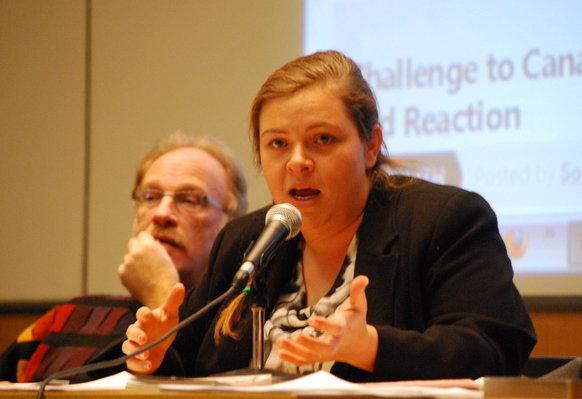If Ontario becomes the only province to legally allow prostitution, municipalities will likely take a role in regulating sex work, making the issue one of Toronto mayor-elect Rob Ford’s first orders of business, says Osgoode Hall law professor Alan Young.
But even with a newly created municipal bylaw, Young admits, sex work could end up recriminalized, but without provision in the criminal code.
“I think it’s interesting that this issue may be thrust upon Ford as one of the first municipal issues on his agenda,” Young tells Xtra following a discussion at York University’s Osgoode Hall: The Bedford Decision: Off the Streets? “I have no clue what [Ford’s] position is. I just find it ironic because, as a politician, that’s the last issue you want to deal with, not the first.”
Ford declined to comment to Xtra.
The Ontario Superior Court struck down prostitution laws in Ontario on Sept 28, but the laws have remained in force pending an appeal court ruling that is expected in the coming days.
Young, who represents sex workers Amy Lebovitch, Valerie Scott and Terri-Jean Bedford, speaks about the case with unwavering conviction and rock-solid ethics, yet he remains guarded on the outcome.
“In my 20-year career, this is one of the few cases where I feel the argument is bordering on incontrovertible,” Young says. “I don’t see what the other side is. That leads me to believe this should be a victory all the way. But I’m also very painfully aware of the conservative nature of the Ontario Court of Appeal.”
Young, along with a panel of experts, spoke about the landmark case to a lecture hall full of law students Nov 24.
Also on the panel was Emily van der Meulen, a fellow with the Centre for Research on Inner City Health; Christa Big Canoe, a First Nations lawyer; and moderator Sonia Lawrence, a constitutional law and gender equality law professor at Osgoode.
If the stay is lifted, Young says, a temporary municipal bylaw will need to be created until the federal government makes its decision. But that may still be a long time coming.
“Create a bylaw of a temporary nature that restricts locations and restricts the size until we see what the federal government wants to do. That will solve the so-called nuisance issue of having large-scale brothels in residential areas. So I think it’s a very simple bylaw to pass,” Young says.
The Nov 27 expiration date comes after the federal and provincial governments made an application to Ontario Court of Appeal justice Marc Rosenberg to stay a Sept 28 decision by Justice Susan Himel beyond the 60-day deadline. The stay allows their representatives more time for a proper appeal.
If Rosenberg fails to make a decision, the stay will be extended, Young says.
Himel’s ruling strikes down three criminal code provisions surrounding prostitution, declaring them unconstitutional. They are: laws that forbid soliciting, keeping a bawdyhouse and living off the avails of prostitution. Himel concluded that the current laws are harming sex workers by putting them in danger and punishing victims.
The biggest change is that sex workers will be free to work indoors and in groups, without triggering Canada’s bawdyhouse laws, says Young. It also means hookers will be able to hire drivers, bouncers and bodyguards to keep themselves safer.
Valerie Scott, executive director of the Sex Professionals of Canada, laughs at the alarmist scenarios suggested by the Crown, such as Canada becoming a mecca for sex tourism and increased child prostitution, she says.
“In court, the Crown just couldn’t say pimps and children enough,” she says. “It was amazing to watch the Crown’s logic, none of which made sense. It was just a lot of pimp panic.”
“Himel struck these laws because they are harmful to sex workers and harmful to communities, not to mention outrageously expensive to enforce. The highest-paying customers are the taxpayers. There has never been a case in Canadian history like this.”
Scott says the Crown is “playing around with the safety of sex workers.”
“It’s unconscionable,” Scott says. “They are putting misguided sexual morals before lives.”
Michael Morris, the lawyer for the federal government, who declined to comment to Xtra, told court that the allowance of prostitution would “usher in a social experiment unprecedented in this country.”
He argues that throwing out the laws will cause “irreparable harm to both sex workers and communities” and says it opens the door for a host of social evils and the general destruction of residential communities.
“We’re talking about maybe a year-long period, and it would be impossible to transform Toronto into a sex hot spot in one year,” Young says. “Maybe these people should get off their asses at city council, if they’re really concerned, come up with some regulations.”
But Young admits there’s some truth to what the federal government suggests.
“As I said in court, everything they say can happen, but it’s not sufficient reason to stay a very important constitutional decision. It’s impossible any of it will happen in the next 12 months.”

 Why you can trust Xtra
Why you can trust Xtra


